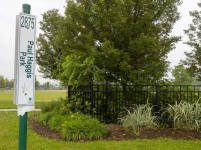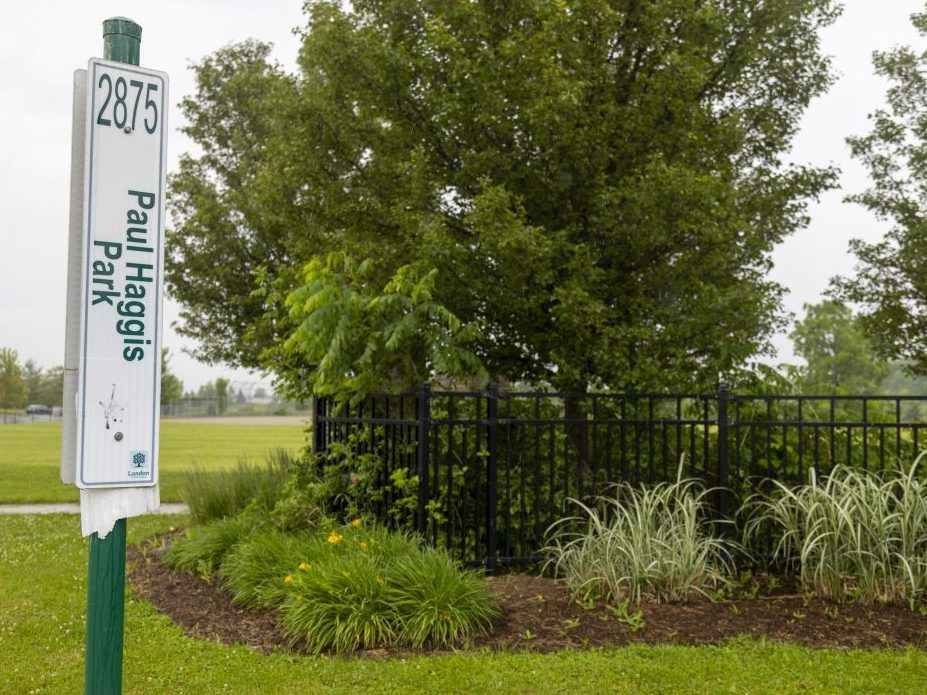New allegations against Paul Haggis revive debate over stripping name from London, Ont. park
The celebrity director has been arrested in Italy on suspicion of sexual assault and aggravated personal injury.
Author of the article:Jennifer Bieman
Publishing date:Jun 21, 2022 • 1 day ago • 3 minute read • Join the conversation
A London park is named after city-born director Paul Haggis, who has been accused by a woman in Italy of sexual assault -- again raising the issue of namesake landmarks. (Mike Hensen/The London Free Press)
A London park is named after city-born director Paul Haggis, who has been accused by a woman in Italy of sexual assault -- again raising the issue of namesake landmarks. (Mike Hensen/The London Free Press)
London’s mayor is not yet pushing to re-evaluate the name of Paul Haggis’ namesake park in south London, despite the celebrity director’s arrest in Italy on suspicion of sexual assault and aggravated personal injury.
The London-born Oscar-winning moviemaker, 69, was detained in the southern town of Ostuni after an unidentified woman pressed charges against him. However, the director’s attorney has insisted Haggis is “totally innocent.”
In a statement published by Variety, Haggis’ personal attorney Priya Chaudhry said: “Under Italian law, I cannot discuss the evidence. That said, I am confident that all allegations will be dismissed against Mr. Haggis. He is totally innocent and willing to fully co-operate with the authorities so the truth comes out quickly.”
The Hollywood heavyweight, who grew up in London and went to Catholic Central high school before moving to California, is best-known for directing the Oscar-winning films Crash and Million Dollar Baby.
In 2011, the city named a park nestled in a subdivision near White Oaks Road and Bradley Avenue for the famed director.
The latest accusations against Haggis are concerning, London’s mayor said Monday, stopping short of calling for the removal of his name from the south-end park.
“These allegations are very serious, and troubling,” Mayor Ed Holder said in a statement Monday.
Referring to council’s move last week to strip Trooper Mark Wilson’s name from a park and street after the Free Press revealed the slain Canadian soldier pleaded guilty at a court martial to assaulting a fellow soldier in the midst of sexual advances without her consent, Holder said the next step on Paul Haggis Park is less clear.
“Unlike where Trooper Wilson was concerned, at this time we have neither a guilty plea, nor the results of a legal proceeding to help inform our next course of action. Regardless, I think this is yet another example why naming landmarks after people is an exercise fraught with risk,” he said.
A review by city staff of the policies that govern the naming of streets and other landmarks in the city already was ongoing when council voted to take Wilson’s name off the public amenities.
“That work is actively underway, and a report is expected back shortly after the swearing-in of the next council,” Holder said.
The latest allegations against Haggis are not the first time the continued use of his name on the park has come under scrutiny.
In 2018, Haggis was accused of sexual harassment and assault by four women who filed a lawsuit in New York. The alleged incidents took place between 1996 and 2015.
None of the accusations have been proven in court and no criminal charges against Haggis have been laid in the New York case.
At the time, a London city council committee declined to recommend stripping Haggis’ name off the park, opting instead to wait for a court decision on the allegations.
Waiting until a court renders a verdict or releases a decision is a sensible approach to grappling with namesakes who become contentious through their words or actions, said Duncan Koerber, an assistant professor at Brock University specializing in crisis communication.
During the past decade, the public has become increasingly sensitive to the story – and potential moral failings – of the people behind the place name, Koerber said.
Stripping the name of Egerton Ryerson, an architect of Canada’s residential school system, off Ryerson University in Toronto is a prime example of the public and political sensitivity around celebrating fallible public figures, he said.
“It’s a trend nowadays to be concerned with people who were, at one point, acceptable people, but a few years later something happens and they’re considered almost enemies. It’s very common,” Koerber said.
“There’s really an appetite for symbolic change.”
Naming any public place after a person, living or dead, has its risks, Koerber said. New details can emerge about an honouree’s life, or cultural norms can shift public perception of a one-time hero, he said.
Koerber is doubtful even the most in-depth policy on naming public amenities after community heroes will head off all potential controversy in the future.
“People change, human beings are fallible and things change over time. It would be almost impossible for cities to investigate every single aspect of a person’s life,” he said. “For cities, you always just have to look at these things and do the best you can at the time.”
– with files by National Post Wire Services
jbieman@postmedia.com
Twitter.com/JenatLFPress


 torontosun.com
torontosun.com
The celebrity director has been arrested in Italy on suspicion of sexual assault and aggravated personal injury.
Author of the article:Jennifer Bieman
Publishing date:Jun 21, 2022 • 1 day ago • 3 minute read • Join the conversation
A London park is named after city-born director Paul Haggis, who has been accused by a woman in Italy of sexual assault -- again raising the issue of namesake landmarks. (Mike Hensen/The London Free Press)
A London park is named after city-born director Paul Haggis, who has been accused by a woman in Italy of sexual assault -- again raising the issue of namesake landmarks. (Mike Hensen/The London Free Press)
London’s mayor is not yet pushing to re-evaluate the name of Paul Haggis’ namesake park in south London, despite the celebrity director’s arrest in Italy on suspicion of sexual assault and aggravated personal injury.
The London-born Oscar-winning moviemaker, 69, was detained in the southern town of Ostuni after an unidentified woman pressed charges against him. However, the director’s attorney has insisted Haggis is “totally innocent.”
In a statement published by Variety, Haggis’ personal attorney Priya Chaudhry said: “Under Italian law, I cannot discuss the evidence. That said, I am confident that all allegations will be dismissed against Mr. Haggis. He is totally innocent and willing to fully co-operate with the authorities so the truth comes out quickly.”
The Hollywood heavyweight, who grew up in London and went to Catholic Central high school before moving to California, is best-known for directing the Oscar-winning films Crash and Million Dollar Baby.
In 2011, the city named a park nestled in a subdivision near White Oaks Road and Bradley Avenue for the famed director.
The latest accusations against Haggis are concerning, London’s mayor said Monday, stopping short of calling for the removal of his name from the south-end park.
“These allegations are very serious, and troubling,” Mayor Ed Holder said in a statement Monday.
Referring to council’s move last week to strip Trooper Mark Wilson’s name from a park and street after the Free Press revealed the slain Canadian soldier pleaded guilty at a court martial to assaulting a fellow soldier in the midst of sexual advances without her consent, Holder said the next step on Paul Haggis Park is less clear.
“Unlike where Trooper Wilson was concerned, at this time we have neither a guilty plea, nor the results of a legal proceeding to help inform our next course of action. Regardless, I think this is yet another example why naming landmarks after people is an exercise fraught with risk,” he said.
A review by city staff of the policies that govern the naming of streets and other landmarks in the city already was ongoing when council voted to take Wilson’s name off the public amenities.
“That work is actively underway, and a report is expected back shortly after the swearing-in of the next council,” Holder said.
The latest allegations against Haggis are not the first time the continued use of his name on the park has come under scrutiny.
In 2018, Haggis was accused of sexual harassment and assault by four women who filed a lawsuit in New York. The alleged incidents took place between 1996 and 2015.
None of the accusations have been proven in court and no criminal charges against Haggis have been laid in the New York case.
At the time, a London city council committee declined to recommend stripping Haggis’ name off the park, opting instead to wait for a court decision on the allegations.
Waiting until a court renders a verdict or releases a decision is a sensible approach to grappling with namesakes who become contentious through their words or actions, said Duncan Koerber, an assistant professor at Brock University specializing in crisis communication.
During the past decade, the public has become increasingly sensitive to the story – and potential moral failings – of the people behind the place name, Koerber said.
Stripping the name of Egerton Ryerson, an architect of Canada’s residential school system, off Ryerson University in Toronto is a prime example of the public and political sensitivity around celebrating fallible public figures, he said.
“It’s a trend nowadays to be concerned with people who were, at one point, acceptable people, but a few years later something happens and they’re considered almost enemies. It’s very common,” Koerber said.
“There’s really an appetite for symbolic change.”
Naming any public place after a person, living or dead, has its risks, Koerber said. New details can emerge about an honouree’s life, or cultural norms can shift public perception of a one-time hero, he said.
Koerber is doubtful even the most in-depth policy on naming public amenities after community heroes will head off all potential controversy in the future.
“People change, human beings are fallible and things change over time. It would be almost impossible for cities to investigate every single aspect of a person’s life,” he said. “For cities, you always just have to look at these things and do the best you can at the time.”
– with files by National Post Wire Services
jbieman@postmedia.com
Twitter.com/JenatLFPress


New allegations against Paul Haggis revive debate over stripping name from park
London's mayor is not yet pushing to re-evaluate the name of Paul Haggis’ namesake park in south London, despite the celebrity director’s arrest in Italy on suspici…